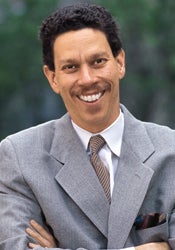Harvard Law School Professor David Wilkins ‘80 delivered a lecture, “Making Global Lawyers: Legal Education, Legal Paradox, and the Paradox of Professional Distinctiveness” on Oct. 19th to mark his appointment as the Lester Kissel Professor of Law.
HLS Dean Martha Minow introduced Wilkins, HLS’s first vice dean of global initiatives on the legal profession, noting: “The match between David Wilkins and the Lester Kissel professorship is really quite extraordinary.” Lester Kissel ’31 established a professorship in ethics at HLS reflecting his “abiding concern for the critical importance of ethical practice in the legal profession.” Wilkins, she said, among his many accomplishments “invented the country’s first four-credit course on the legal profession,” one which remains the most sought after in the curriculum.” He also created and directs the Program on the Legal Profession, and his wide-ranging research explores areas including the organizational and economic context influencing ethics in law practice; the career paths of lawyers; the study of diversity in the profession; and the exploration of how corporations purchase legal services, including the offshoring of legal work.
Wilkins began his lecture by noting that today’s legal world is often seen either as undergoing a fundamental paradigm shift or “as just business as usual.” He cautioned that while “it’s too early to tell” which of these views is correct, “it’s probably unlikely to be either.”
Wilkins observed, “We’re seeing big trends that have been going on long before the crash of 2008, that were accentuated by the crash and that are likely to have important implications for everything we do.” He provided several examples of these changes, including “the globalization of economic activity, … the rise of information technology,” and the “blurring together of the categories of knowledge that we have come to rely on at least since the 19th century,” even “the distinctions between the professions themselves,” such as law and business, for example.
According to Wilkins, the blurring of these distinctions along with changes to organizational forms, has led to a huge “reduction in information asymmetry” and to “the unbundling of services along global supply chains.” In this new world, he said, we measure less by “inputs” such as reputation and credentials, than by “value added outputs.”
And in today’s world, he continued, the institutionalization of legal practice and its globalization has moved the profession “from firms that are sealed off tightly from one another to much more fluid networks,” leading to “intense competition across global markets.”
Despite these changes, “It’s important to recognize that most lawyers around the world continue to practice in ways that are very similar to the ways in which they practiced a generation and a century ago, even in the United States” through solo practice or small firm practice, he said. Nevertheless, Wilkins observed that recently, “we have seen the rise of large law firms, and not just in the developed West.” Wilkins also described the modern rise of in-house counsel, which has moved from a U.S. phenomenon to a global phenomenon, citing India’s Tata Group as an example.
Wilkins also stressed that the global legal profession is “not just a boys’ club anymore.” Law, he said, “was traditionally the most restricted profession maybe in the world. … but this is changing.” All over the world, he said, law is becoming “an increasingly feminized profession.” In U.S. law schools, women make up 50 percent of the student body, and this is lower than in other countries. In the U.K., it’s more like 58 percent; in Sweden 65 percent; and in Brazil, closer to 70 percent. Law is becoming dominated by women, said Wilkins, and this “will have profound implications for how we think about the legal profession.” He noted that in many other ways, the profession is becoming increasingly diverse, in terms of race, religion, sexual orientation, disability, and other categories.
Wilkins also noted that the market for lawyers is changing dramatically. There used to be relatively few lawyers in concentrated in relatively bounded geographic areas, and lots of policies that restricted competition. Today, we have moved to a world of what some economists call “winner take-all-competition,” he said, for both clients and for lawyers, and we have seen the “rise of market practices.” This has changed how we think about what we do, said Wilkins, and it has changed who makes the decisions that shape legal practice. And all of this is happening in an increasingly globalized legal environment, where there is no global legal order.
But complexity increases demand, said Wilkins, and he predicted an increased demand for what lawyers do. The bad news for attorneys, he said, is that many people are competing for this work—and they are not all lawyers. In addition, technology will further decrease the need for “bespoke” legal services. And at the same time, the demand for an increasingly mobile legal work force is emerging.
This raises an important array of questions for legal education, Wilkins said, including whether the purpose of this education is to socialize students into this new world or challenge it. “Should we embrace the market, fight it or try to lead it?” he asked.
How we figure out the answers, said Wilkins, is important “not just for us but … for society” because of the role lawyers will continue to “play in the development of the modern state.”
Yet he ended with a final question: If lawyers just respond to the challenges of the global marketplace, why should they be entitled to any particular autonomy or distinction? One of the answers, he concluded, is that “clients need the legitimacy of lawyers who are themselves legitimate.” The idea that lawyers are independent and have some commitment to the public good means they bring something to the table “you can’t get from your public relations specialist.”
– Greg DiBella
